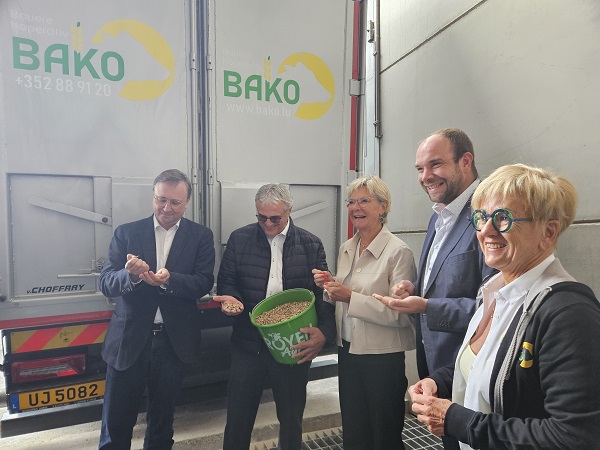 Credit: Jazmin Campbell, Chronicle.lu
Credit: Jazmin Campbell, Chronicle.lu
On Friday 5 September 2025, representatives of Luxembourg's cereal sector and the press gathered at the premises of Bauere Koperativ (BAKO) in Hosingen for the presentation of the national harvest report.
Following a visit to BAKO's grain storage warehouse to view the newly harvested spelt, Luxembourg's Minister of Agriculture, Food and Viticulture, Martine Hansen, and representatives of the cereal industry delivered a mixed message: while yields and quality were generally very good, the (international) market situation remains poor.
BAKO President Georges Peping and Managing Director Günter Mertes opened the presentation with an overview of the cooperative and the Hosingen site. Mr Mertes delivered a harvest review of alternative crops (spelt, oats, legumes). In terms of weather, he noted a warm and dry spring and summer with north-east winds, as well as rain during the harvest. Looking at specific crops, he reported:
- Barley: excellent quality (over 66 HL) with acceptance quantities up to 50% higher than in 2024
- Triticale: slightly lower increase in acceptance (33%); 65% of good quality but weather-related moisture issues in part of the crop
- Wheat: excellent quality (over 76 HL) with acceptance up to 50% higher than in 2024; about 5% of wheat was organic; about 15% of lots showed issues with HL weight or moisture
- Oats: the cooperative's largest crop in 2025, with doubled acceptance volumes; excellent quality despite difficult weather conditions; positive price development compared to barley and wheat
- Spelt (Dinkel): best quality despite dangerous weather conditions (rain during harvest); doubled acceptance volumes; development potential of +33% for 2026; further positive price development as in 2024
- Grain legumes: rain during harvest; feeding trials yielded promising results.
Klaus Palzkill from the Executive Committee of De Verband Group / VERSIS SA (active in Luxembourg, Germany, Belgium and France) subsequently reviewed the harvest and market developments. Using various charts, he showed that prices remained stable for rapeseed (+5.3%), but dropped for feed barley (-11.4%), feed wheat (-7.9%) and rye (-7.9%) over one year. Despite poor grain prices, the grain harvest was good across Europe (+10% in Germany, +25-30% in France). Nevertheless, Black Sea exports and record global grain production put pressure on markets and determined price levels. Farmers' profitability remains under strain: while wheat revenues rose from €820 / ha in 2024 to €1,240 / ha in 2025, production costs left an average net result of -€105 / ha. Rapeseed remained one of the few profitable crops. Still, the situation in Ukraine remains a major source of uncertainty and market recovery is not currently foreseeable.
LSG (Luxembourg Seed Producers Cooperative) Managing Director Steve Turmes proceeded with a seed production review. He noted that LSG currently produces over 70 varieties of seven types of grain. Weather conditions favoured sowing (particularly from end October) and growth, leading to above-average yields of mostly very good quality (few exceptions).
Frédéric Baijot, Managing Director of Moulins de Kleinbettingen, next looked at locally produced bread wheat and durum wheat (pasta). In 2025, 2,142 hectares of soft wheat under the "produit du terroir" label were cultivated, yielding nearly 12,000 tonnes (+35% compared to 2024). Protein quality has been good this year. Durum wheat, more challenging to grow in Luxembourg, nevertheless reached 600 tonnes this year.
Mr Baijot also presented new breakfast cereal products made with Luxembourgish oats and noted that work on developing new terroir-adapted varieties is being reinforced. He said he was "very happy" with the harvest this year, although prices will remain a challenge.
Minister Hansen closed the event with the official national harvest review (all crops combined). Approximately three-quarters of agricultural land is used to produce forage for ruminant nutrition. Yields on meadows and pastures are average this year, but the quality is above average. The corn harvest has already begun in some places, and a good harvest year is expected nationwide.
Minister Hansen emphasised that in these times of geopolitical instability, volatile producer prices, rising production costs and extreme weather fluctuations, it is increasingly important for farmers to diversify their production, manage their operations prudently and take out insurance against crop losses, for which the Ministry of Agriculture subsidises 65% of the insurance premiums. Drought damage occurred only in the country's arid regions due to a lack of rainfall in April and May; the damage rate is considered low.
She praised the sector for its resilience and innovation, but reiterated the importance of EU and national support schemes and diversification.
The harvest review for Luxembourg's grape sector will be presented on Thursday 18 September 2025.








